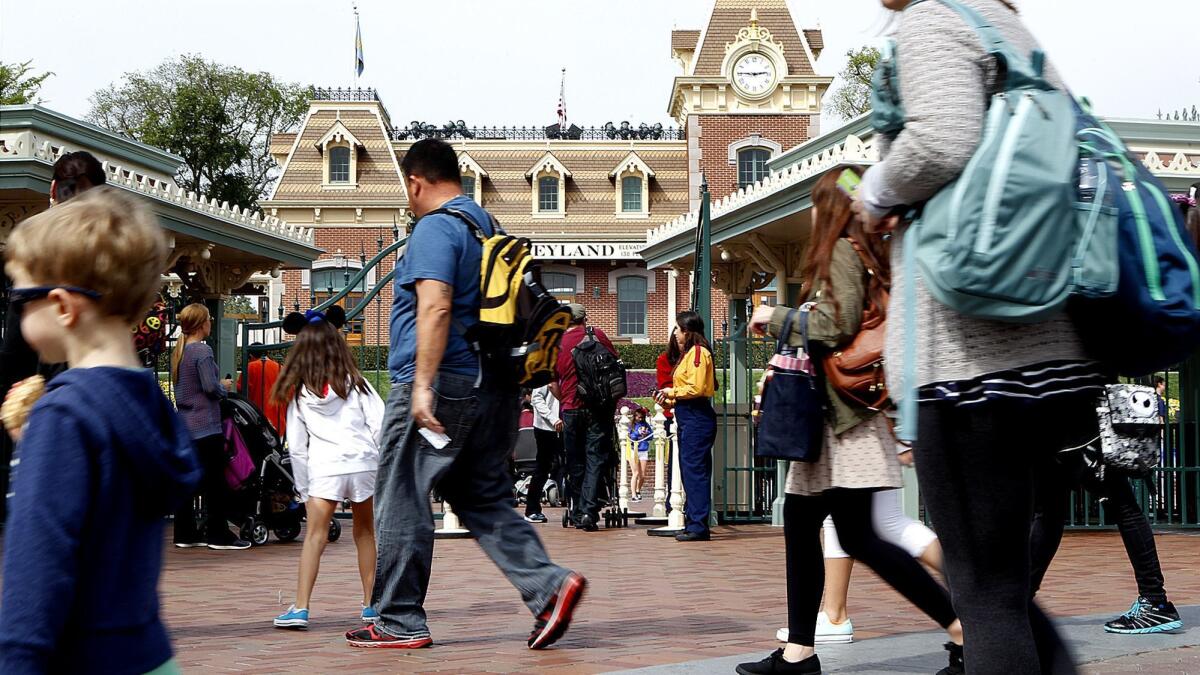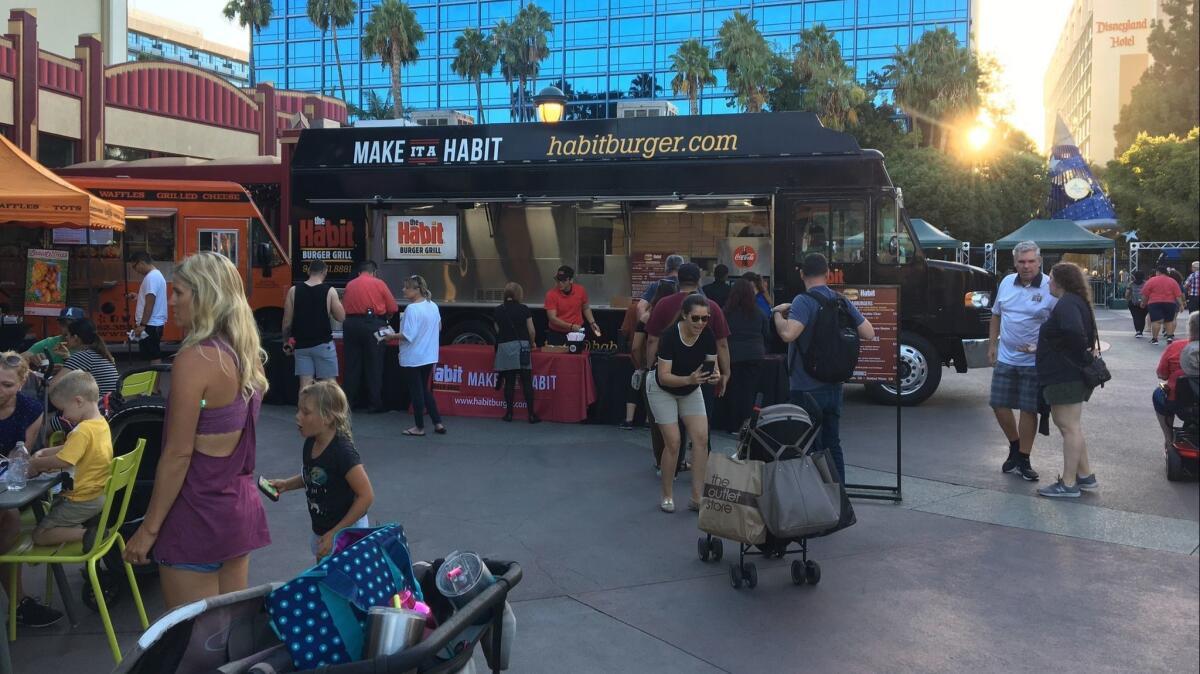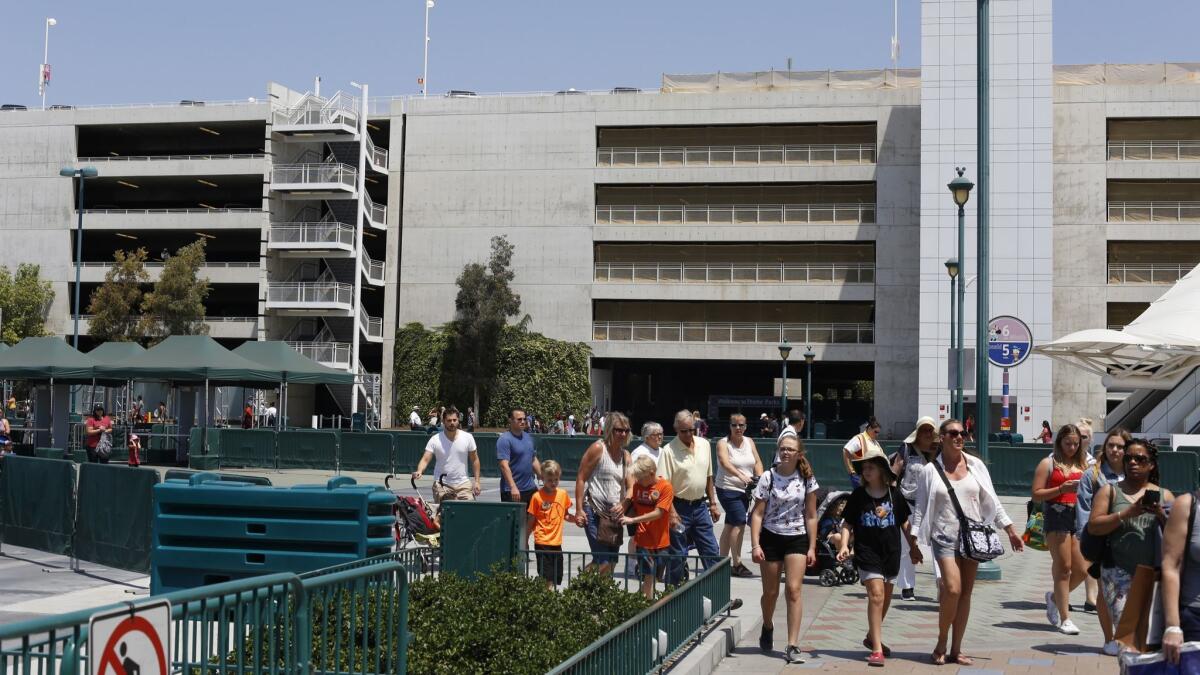Is Disneyland exempt from Anaheim’s ‘living wage’ ballot measure? The debate rages

When Anaheim voters go to the polls Nov. 6, they will decide whether large hospitality companies that receive a tax rebate from the city will be forced to pay their workers a “living wage.”
What is unclear is whether the initiative, Measure L, will apply to the city’s biggest employer of all, the Disneyland Resort — an uncertainty hinging on how to interpret a decades-old agreement to build a $108-million parking garage for the resort.
The leaders of the unions that represent the Walt Disney Co. workers — the same ones who collected about 20,000 signatures to put the initiative on the ballot — say the measure certainly applies to the popular Anaheim resort.
“They know it does apply to them but they are not going to say it,” said Austin Lynch, organizing director for Unite Here, the union that represents hotel workers, food service employees and others in Orange County.
The city of Anaheim disagrees but has yet to issue a formal opinion, and officials with the Burbank media and entertainment company won’t comment on the matter.
The measure asks that “hospitality industry employers located in the Anaheim or Disneyland Resort Specific Plan Zones that have tax rebate agreements with the city” be required to increase their minimum wage and raise it annually to reflect the cost of living.
Until recently, the resort had two tax rebate agreements with the city: A 2016 deal to reimburse the resort $267 million in hotel taxes if Disney agrees to build a luxury hotel in the resort; and a second agreement that ensures the city won’t adopt any entertainment taxes for 30 years in exchange for the resort’s promise to invest $1 billion in the resort.
At the request of the resort’s president, who said the tax breaks were causing strife with the city and its residents, the Anaheim City Council voted unanimously last month to end both agreements.
Disney also put on hold its plans to build a luxury hotel in the Downtown Disney shopping district. Several businesses, including popular eateries, were closed to make way for the hotel construction. Food trucks have been deployed to fill the dining gap.
The move by the council to kill the tax subsidy deals seemed to have guaranteed that Measure L wouldn’t apply to the 30,000 workers at the Disneyland Resort.
But under a 1996 agreement to build the six-story parking garage, the city issued 40-year bonds and agreed to pay them off with taxes collected mostly from Disney but also from bed taxes from hotels throughout the city. Meanwhile, Disney collects the parking revenue from the garage — more than $35 million a year. Once the bond is paid off, the city has agreed to transfer ownership of the garage to the resort.

Richard McCracken, an attorney who helped draft the ballot initiative on behalf of the union, says the deal fits the ballot measure’s definition of a tax rebate because taxes collected by the city are being used to benefit the resort.
“This bond financing was arranged to help Disney and all of the taxes used to pay for the bonds will be going to benefit Disney,” said McCracken, a longtime labor lawyer who helped write several “living wage” ordinances throughout the state.
Other legal experts say the legal question is not so clear cut, suggesting that the dispute may ultimately be decided in a court of law if the measure passes and Disney refuses to pay the higher wages.
Michael Thom, an assistant professor in public policy at USC and expert on public finance and tax incentives, lines up on the side of those who thinks the measure doesn’t apply to the Disneyland Resort.
He notes that the 1996 agreement does not return any taxes directly to the Disneyland Resort but instead uses them to pay off the construction bond.
“I doubt the 1996 agreement regarding the parking structure can be interpreted as a subsidy as defined in the ordinance,” he said.
Kirk Stark, a UCLA professor of tax law and policy, also thinks the parking garage deal may not fit the definition of a tax rebate but he is not as certain.
“You could easily see people making arguments on both sides” of the debate, he said. “It all turns on how one interprets those words.”

If the question ends up in litigation, Stark said a judge may consider the intent of those who brought the measure forward.
Meanwhile, Anaheim voters will get conflicting messages from supporters and opponents about the measure, with opponents saying it clearly does not apply to the Disneyland Resort.
Todd Ament, president of the Anaheim Chamber of Commerce and member of a coalition of business leaders that has campaigned against Measure L, accused McCracken of misleading voters.
“The lawyer for the proponents is simply mouthing the words his client asked him to for political purposes to try to salvage a campaign that no longer has any significant purpose,” he said.
Despite repeated requests, Disney officials have declined to comment on the debate, referring all questions on the measure to the city of Anaheim.
Michael Lyster, the city’s spokesman, issued a statement saying “the initiative does not appear to cover the 1996 public-private partnership between Anaheim and Disney, focusing instead on tax rebates and the entertainment tax policy.”
“But we do not yet have a definitive legal determination,” he added. “Typically, we don’t weigh in on issues coming before voters. We tend to leave that to voters and those on either side of on an issue.”
At the request of Anaheim Councilwoman Kris Murray, the city attorney is scheduled to discuss the measure during the council’s Oct. 9 meeting and offer a legal opinion on whether it applies to the Disneyland Resort.
The measure, if approved by a majority of voters, would require hospitality businesses with more than 25 employees to pay workers a minimum of $15 an hour starting Jan. 1, 2019, with salaries rising $1 an hour every Jan. 1 through 2022. Once the wage reaches $18 an hour, annual raises would then be tied to the cost of living.
The resort recently reached a contract agreement with four unions, representing 9,700 workers. The three-year contract raised the minimum hourly rate of $11 to $13.25 immediately and to $15 starting in January. An increase to $15.50 an hour is slated for June 2020.
If the ballot measure is approved, it would supersede the union contracts and would apply to all 30,000 workers who make less than $15 an hour in the resort.
A coalition of unions began a campaign Saturday to promote Measure L, with about 50 volunteers, wearing union T-shirts, walking through neighborhoods, urging residents to support the measure.
“We believe it does apply and will campaign on that,” said Lynch, the union director. “We are going to tell people that it applies.”
To read more about the travel and tourism industries, follow @hugomartin on Twitter.
More to Read
Inside the business of entertainment
The Wide Shot brings you news, analysis and insights on everything from streaming wars to production — and what it all means for the future.
You may occasionally receive promotional content from the Los Angeles Times.









